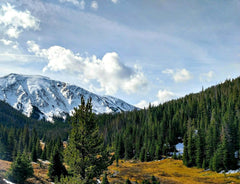“Our kids are out of shape, tuned out and stressed out, because they're missing something essential to their health and development: connection to the natural world." National Wildlife Federation
The seasons are turning, and children are knee deep in academics again. The natural world of summer seemed to disappear like campfire smoke; replaced by the concrete walls, chalk, and artificial light that is school. Getting in nature has been placed on the back burner for most. The popularity of video games and a lack of unscheduled time doesn’t help this. Many would say that kids today seem to be deficient in nature and need the great outdoors more than ever before. The value of the wild is becoming unknown by children and adults alike. However, outdoor enthusiasts can help remedy that by advocating for families to do more activities outside such as camping, canoeing, and hiking. The combination of physical activity and visual stimuli that hiking provides, can teach life lessons to kids they may not receive anywhere else. Here are just some of those lessons.

Leave No Trace
Kids who hike, camp, and explore the wilderness learn the responsibility of leaving no trace. They see how individual actions can harm not only the land, but the people who visit it. Simple things like putting campfires out can stop wildfires, while respecting wildlife teaches them morals. The concept of leaving the wild, wild, helps kids recognize the value of protecting animals, plants, and the wilderness in general. One great way to instill this is to pick up trash while you hike or take kids to volunteer to clean up local trails. As they pick up other people’s litter, they can see the damage that is done to animals and the ecology when public lands are abused. This opens their eyes to the fact that trash doesn’t disappear on its own, so clean up after yourself!
Be Adventurous
Exploring nature and being outside instills a sense of adventure in children, helping them build their imagination. Kids are naturally drawn to the unkempt and dirty aspect of the wild. The wilderness inspires bravery to try new things and boosts confidence. Young ones who spend time in the wild learn about weather, plants and animals. They become less afraid of bugs, beasts, and the unpredictable; while also learning about how to stay safe outdoors. Many kids who hike will learn first aid early on, and other life skills that they’ll carry with them into adulthood. Having a sense of adventure at an early age means trying new sports, hobbies, and other activities. This love of physical activity can help decrease the rates of obesity and even depression that’s so prevalent in youth today.

Respect and Empathy
Respect can be hard to learn, depending on your life circumstances; but children who spend time in nature learn it naturally. They also learn empathy while observing bird’s nests, baby animals, and wildlife in general. As you take a child on a hike, educate them about how each animal lives and survives. When we teach kids to honor wildlife and let the animals go about their daily routine of survival, they become more compassionate people. Children who are empathetic toward animals tend to be the same toward humans. Spending time on trails and in public lands educates everyone on the creed of respect. When we respect the wild, we all can continue to go back and experience nature’s beauty for years to come.
Lessons aside, getting in nature encourages a healthy lifestyle. There have been numerous studies over the years proving that physical activity not only increases serotonin levels, but also boosts scholastic performance. Natural light decreases fatigue and gets the brain juices flowing, while students who are more physically active have better academic scores. With many schools giving up physical education to focus on other subjects, it’s important to instill the value of nature and movement outside of school. If we get children in the wild and replace screen time with green time; we will raise up youth leaders in defense of nature. Public lands and the climate can never have enough young advocates fighting for them today and especially tomorrow. Hiking might not be the answer for every kid, but it’s quite possible it could be life-changing; opening their eyes to a whole new world.




 Previous:
Make 2020 A Daring Adventure
Previous:
Make 2020 A Daring Adventure
 Next:
Make Your Home More Green for Earth Day (Beeswax Wraps Recipe Included!!)
Next:
Make Your Home More Green for Earth Day (Beeswax Wraps Recipe Included!!)
Comments
Posted November 07, 2019 by Anonymous
MZBmQNgPvqaSCKw
Posted November 08, 2019 by Anonymous
peTLwCXtdmRVnM
Posted November 08, 2019 by Anonymous
YNcaFuMt
Posted November 08, 2019 by Anonymous
hKuTywVIanJofPEC
Posted November 08, 2019 by Anonymous
MHUAVojOiTePp
Posted November 18, 2019 by Anonymous
rgudieGOIS
Posted November 18, 2019 by Anonymous
kJaZEdxuPGs
Posted November 19, 2019 by Anonymous
msluEXtipqywT
Posted November 19, 2019 by Anonymous
mHMqDxWRufEcgos
Posted November 21, 2019 by Anonymous
WJqTeKhIZksSbwc
Posted November 21, 2019 by Anonymous
rtFeCsLQIJT
Posted November 21, 2019 by cngNwtJavWxYQUyP
KAUizVpdP
Posted November 21, 2019 by XapvUqlk
AWoQnEgVZfMdFT
Posted November 21, 2019 by Anonymous
MxJWcstUGLd
Posted November 21, 2019 by Anonymous
bAVfDrhqJRgzGwe
Posted November 23, 2019 by Anonymous
TgFsCVYQecZUuhnk
Posted November 23, 2019 by Anonymous
pUomxFJeS
Posted November 27, 2019 by Anonymous
jXhyPkWf
Posted November 27, 2019 by Anonymous
VIonqBGjC
Posted December 12, 2019 by Anonymous
rQCxbuTA
Posted December 12, 2019 by Anonymous
isWNzuJwSlPyD
Posted December 12, 2019 by Anonymous
NRMOgLmPfdYK
Posted December 12, 2019 by Anonymous
iVxtJQjhNZOwSgFy
Posted December 14, 2019 by Anonymous
mNiykIwVldaqcRM
Posted December 14, 2019 by Anonymous
fprekKLmRly
Posted December 16, 2019 by Anonymous
rOwBjFHimvlUNh
Posted December 16, 2019 by Anonymous
vzYubZaqo
Posted December 17, 2019 by Anonymous
iARjsXFzZCm
Posted December 17, 2019 by Anonymous
icmblHpEr
Posted March 14, 2021 by fdbnqqfenl
Muchas gracias. ?Como puedo iniciar sesion?